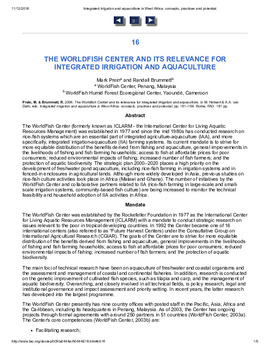The WorldFish center and its relevance for integrated irrigation and aquaculture

Citation
Prein, M.; Brummett, R. (2006). The WorldFish center and its relevance for integrated irrigation and aquaculture. p. 161-164. In M. Halwart & A.A. van Dam, eds. Integrated irrigation and aquaculture in West Africa: concepts, practices and potential. Rome, FAO. 181 pp.
The WorldFish Center (formerly known as ICLARM - the International Center for Living Aquatic Resources Management) was established in 1977 and since the mid 1980s has conducted research on rice-fish systems which are an essential part of integrated agriculture-aquaculture (IAA), and more specifically, integrated irrigation-aquaculture (IIA) farming systems. Its current mandate is to strive for more equitable distribution of the benefits derived from fishing and aquaculture, general improvements in the livelihoods of fishing and fish farming households; access to fish at affordable prices for poor consumers; reduced environmental impacts of fishing; increased number of fish farmers; and the protection of aquatic biodiversity. The strategic plan 2000-2020 places a high priority on the development of freshwater pond aquaculture, including rice-fish farming in irrigation systems and in fenced-in enclosures in agricultural lands. Although more widely developed in Asia, previous studies on ricefish culture activities took place in Africa (Malawi and Ghana). The number of initiatives by the WorldFish Center and collaborative partners related to IIA (rice-fish farming in large-scale and small-scale irrigation systems, community-based fish culture) are being increased to monitor the technical feasibility and household adoption of IIA activities in Africa.
Permalink
Date Available
Type
Publisher
Research Themes
Topics
Language